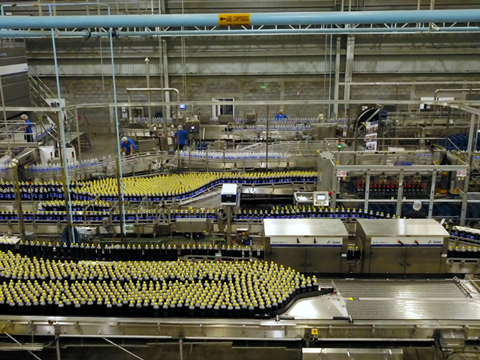
PepsiCo’s exclusive bottler in Mexico, Grupo GEPP, has installed expanded bottling lines for returnable PET and glass, partnering with Sidel to pursue a 10% increase in returnable packaging solutions by 2030.
Grupo GEPP manufactures and distributes bottles for international brands like Pepsi, 7Up, Gatorade, and Lipton at its 44 production facilities across Mexico; it is also the owner of the E-pura and Garci-Crespo brands.
In 2018, the company adopted PepsiCo’s strategy to reduce its consumption of virgin plastic. This includes reducing virgin plastic per serving by 50%, boosting its returnable packaging offering from 10% to 20% by 2030, and achieving net zero emissions by 2040.
That same year, Sidel helped GEPP install a partial returnable glass bottle line at its Puebla facility. GEPP’s universal returnable glass bottle, designed to improve efficiency and agility in production while helping reduce and recycle materials, was launched.
The partners continued with a combined returnable PET and glass line in Apodaca in 2019, then a complete returnable PET line in Guadalajara in 2020.
The latter was designed to handle 2L, 2.5L, and 3L formats, and incorporated a built-in capacity for reusable glass in the future. A returnable PET line and glass line were also introduced in Merida in 2021.
Each of the returnable PET and glass lines features the Hydra bottle washer, designed for improved washing effectiveness, lower chemical and water consumption, and a lower total cost of ownership. Meanwhile, the EvoFILL Glass is an ‘advanced level’ probe filler that targets both improved flexibility and optimized hygiene conditions.
Apparently, GEPP’s partnership with Sidel has resulted in a 30% increase in the incremental PET volume captured by the company, thus helping to avoid the use of virgin resin. Between 2018 and 2023, GEPP claims to have achieved a 73.3% increase in its volume of returnable PET and glass packaging, and a growth in baseline from 100% in 2018 to 173.3% in 2023.
“This ongoing collaboration exemplifies how long-term partnerships—grounded in reliability, service excellence, and technical knowledge-sharing—can enhance operational efficiency, support sustainable business practices, and help customers successfully navigate the evolving demands of the beverage industry,” says Ascención Sánchez, account manager at Sidel.
GEPP goes on to assert that its work with the non-profit association Ecoce has enabled the collection and recycling of six out of every ten bottles produced, allowing GEPP to incorporate 26% of rPET into its packaging by the end of 2023 while reducing its use of PET resin.
PepsiCo was previously among several big brands participating in the Petaluma Reusable Cup Project, launched by the NextGen Consortium to test the effectiveness of serving consumers beverages in reusable to-go cups as the default. Reportedly, the trial yielded a 51% return rate, which was thought to indicate that mandatory reuse could result in envrionmental benefits.
Shortly afterwards, PepsiCo revealed plans to downscale its packaging targets for 2030. While it originally aimed to design 100% of its packaging to be recyclable, compostable, biodegradable, or reusable by 2025, it had only reached 89% by 2023 and has now lowered its ambition to a 97% target for reusable, recyclable, or compostable primary and secondary packaging in its key packaging markets – removing biodegradability from its scope.
In another development, Sidel recently launched the EvoFILL Can Compact filling solution, which is designed to fill 40,000 beverage cans with beer, carbonated soft drinks, and other premium beverages every hour. It intends to provide customers in the low-to-medium speed production market with flexibility and space efficiency.
If you liked this story, you might also enjoy:
The ultimate guide to the Packaging and Packaging Waste Regulation in 2025
How are the top brands progressing on packaging sustainability?
Everything you need to know about global packaging sustainability regulation in 2025
The key to increasing the use of reusable packaging in supermarkets














No comments yet